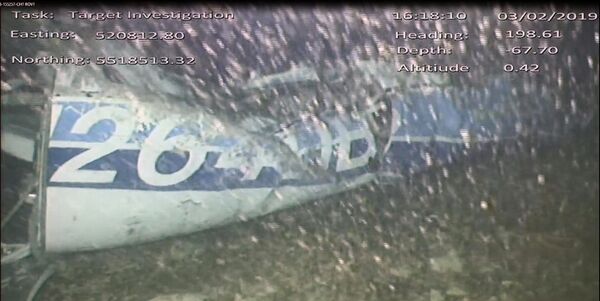The pilot of the Piper PA-46 Malibu aircraft carrying Argentinian striker Emiliano Sala was probably overcome by carbon monoxide fumes, shortly before the plane plunged into the sea near Guernsey, according to a report published on Friday, 13 March.
The Air Accidents Investigation Branch published its final report into the mysterious death of Premier League footballer Sala, who died in January 2019 when the plane he was in vanished.
The report said the pilot David Ibbotson, 59, did not have the correct licence to fly at night or to carry fee-paying passengers.
It said his rating for that type of aircraft had expired in November 2018 and it said there was "significant evidence" Mr Ibbotson had been expecting to be paid for the flight, despite not being licensed to carry passengers.
The report said Mr Ibbotson lost control of the plane, which began to break up in mid-air as it hurtled towards the sea.

Sala, 28, flew to Wales to sign a contract after being signed from Nantes for £15 million during the transfer window and was quoted on the club’s website as saying: “I’m very happy to be here. It gives me great pleasure and I can’t wait to start training, meet my new team-mates and get down to work.”
One year ago today, Emiliano Sala's body was found after a plane crash in the English channel.
— Goal (@goal) February 7, 2020
Gone but never forgotten.
RIP, Emiliano. pic.twitter.com/ZM19KpXFsZ
He then returned to Nantes to say goodbye to his team-mates at the French club.
Football agent, Willie McKay, is understood to have arranged the private plane to bring him back to Wales on 21 January but it never landed and a air-and-sea search was called off a few days later.
The wreck of the plane was later discovered on the seabed and Sala’s body was eventually recovered and buried in his native Argentina.
9eme minute #FCNLOSC #Emiliano #Sala pic.twitter.com/sxfEKArmQB
— CyrilD44 (@CyrilD44) March 1, 2020
The body of Mr Ibbotson has never been found but in August last year the AAIB's initial report said both men - the only people on the single propeller plane - were thought to have been exposed to "potentially fatal" levels of carbon monoxide.
The AAIB report said carbon monoxide "can reduce or inhibit a pilot's ability to fly an aircraft depending on the level of that exposure.”
On Friday, 13 March, Crispin Orr, the AAIB's Chief Inspector, said: "Routine maintenance is vital but cannot eliminate the risk of carbon monoxide leaks completely. Equipping aircraft with devices that provide warning of the presence of this odourless, colourless and lethal gas, would enable pilots to take potentially lifesaving action. We are therefore calling for the regulators to make it mandatory for piston engine aircraft, such as the one involved in this accident, to carry an active carbon monoxide warning device."
And people want to say Cardiff are the bad guys.
— Gareth Baker (@bakermedia_) January 31, 2020
Emiliano Sala’s family are literally working with Cardiff City.
Doubt it’ll get as much attention though! https://t.co/vYadI238Tz
Cardiff City, who were relegated from the Premier League in May last year, are still wrangling with Nantes over the transfer fee.
The Welsh club were ordered to pay the first tranche - £5.3 million - by Uefa but have refused and the case is going to the Court of Arbitration for Sport.
Earlier this week Dorset Police, which is investigating the crash, said it would take no further action against a man arrested in North Yorkshire last year on suspicion of manslaughter in connection with Sala's death.
In the report Mr Orr added: "The chartering of aircraft that are not licensed for commercial transport – so called ‘grey charters’ – is putting lives at risk. We welcome the Civil Aviation Authority’s efforts to stop this practice through their Legal to Fly campaign and other interventions."
Labour MP for Cardiff South and Penarth, Stephen Doughty tweeted: "Such a sad and avoidable tragedy. Will keep up the pressure for Government and industry action on so-called 'grey-charters' worryingly used throughout sport."


